How ChatGPT Could Reshape the Consumer Content Economy
- thefxigroup
- Jul 7
- 3 min read
Updated: Jul 8

In the early days of the web, search engines defined how consumers found content. For nearly two decades, Google dictated the rules—from SEO to clickbait—and businesses across media, commerce, and education optimized for its ecosystem.
Now, with the mainstream use of AI tools like ChatGPT, that dynamic is changing. As TechCrunch reports, ChatGPT referrals to news sites have skyrocketed—from fewer than 1 million per year to over 25 million in 2025. Still modest compared to Google, yes—but the trajectory signals something deeper: the beginning of a consumer discovery shift from link-based search to dialogue-based curation.

From Links to Language: The Consumer Behavior Shift
In traditional search, users type a query and choose among a list of links. In generative AI platforms like ChatGPT, users ask a question—and receive answers that already filter, condense, and (sometimes) cite multiple sources.
This seemingly small interface shift is profound: it reduces friction, boosts trust, and raises expectations for personalized, context-rich responses.
As a result, consumers may no longer go looking for brands or articles—they’ll expect AI to recommend the best fit. And that shifts the power dynamic: from platforms that host content to AI agents that mediate it.
Why This Matters for Content-Driven Industries
If AI becomes the first point of contact for millions of users:
Publishers and media companies must evolve from click-driven headlines to citation-worthy content that’s structured, authoritative, and AI-friendly.
E-commerce and product brands must reimagine SEO strategies and focus on being the “answer” to product-related prompts like “best moisturizers for sensitive skin” or “most durable smart luggage.”
Influencers and creators may need to optimize not just for YouTube or Instagram, but for AI-indexed summaries that source them in product, trend, or topic-based queries.
This isn’t about a traffic rebound—it’s a redistribution of attention across a new interface.
From Discovery to Decision: AI as the Last Click
Today, Google may generate awareness, but users still click through to evaluate. In contrast, ChatGPT can summarize reviews, compare options, and cite prices—all within the conversation.
In that world, AI isn't just the discovery engine—it’s the decision engine. That means the content ecosystem—media, reviews, expert takes, blog posts—must be structured to feed, shape, and support AI outcomes.
Potential Upside: Higher-Quality Traffic & Deeper Engagement
The bright side? While total volume may be lower than search traffic, AI referrals could deliver more qualified visitors. A user who clicks through from ChatGPT has already consumed context. They’re not skimming—they’re ready to act, buy, or learn more.
This opens up new monetization possibilities for AI-aware publishers and D2C brands—especially those who structure their content to align with AI’s citation logic.
What Comes Next?
To thrive in the age of AI-first discovery, consumer-facing content producers need to rethink:
Content structure: Metadata, clarity, authority, and up-to-date information will be key to being referenced.
Partnerships: Licensing deals with AI companies may become a standard revenue channel, just as affiliate links are today.
Brand authority: Third-party credibility will matter more than just keywords. Being cited as a trusted source will beat being #1 in a search list.
Voice & personality: AI-driven browsing may push brands to infuse more identity and expert positioning into their content to stand out.
Final Thought
ChatGPT’s referral surge may not yet rival Google—but its influence is growing. What matters most isn't the traffic volume today, but the interface shift it represents.
For consumer brands, media outlets, and content creators, the next era of online visibility won’t be won on search rankings—it will be earned through AI relevance, expertise, and trustworthiness.
And those who adapt early may become the names AI remembers—and recommends.
Sources:
https://techcrunch.com/2025/07/02/chatgpt-referrals-to-news-sites-are-growing-but-not-enough-to-offset-search-declines/https://www.wsj.com/tech/ai/google-ai-news-publishers-7e687141https://the-decoder.com/chatgpt-usage-for-news-surged-as-google-news-searches-declined/https://www.axios.com/newsletters/axios-media-trendshttps://techcrunch.com/2025/06/10/googles-ai-overviews-are-killing-traffic-for-publishershttps://www.businessinsider.com/openai-sam-altman-predictions-how-ai-could-change-the-world-2025-1



Comments